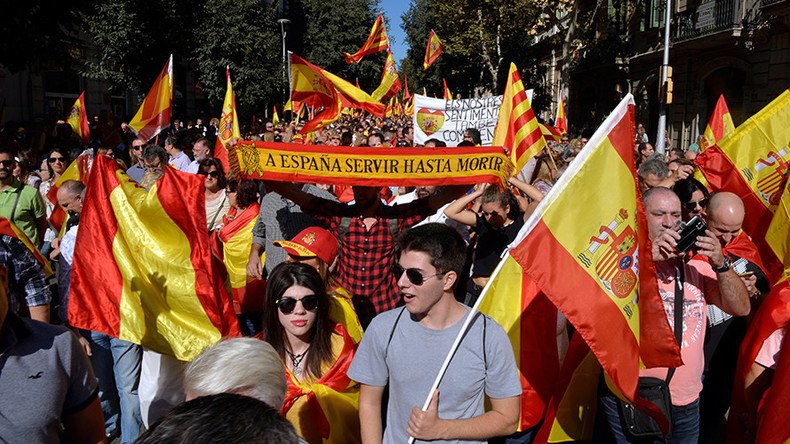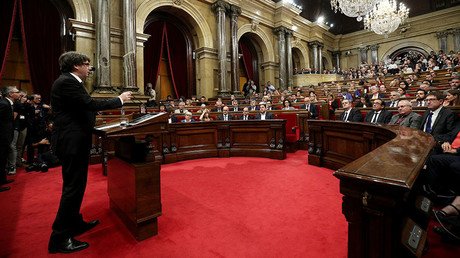Spanish PM seeks clarity on Catalan independence declaration, threatens to suspend region’s autonomy

Spanish Prime Minister Mariano Rajoy has demanded the Catalan authorities clarify whether or not the region declared independence following the local leader’s speech on the October 1 referendum results.
“The cabinet has agreed to require formally to the Catalan government to confirm whether it has declared or not independence,” Rajoy said in a televised address on Wednesday as cited by Reuters.
Catalan regional President Carles Puigdemont’s answer “would determine future events in the next few days,” the PM stated.
Formal confirmation from Barcelona is required to invoke Article 155 of the Spanish constitution, Rajoy said. The article allows Madrid to strip Catalonia of its broad autonomy and take control of some or all of its powers.
This requirement “comes before any other measure that could be taken under Article 155 of the constitution,” the PM said in his Wednesday address to the Spanish parliament.
Madrid wants “to avoid confusion generated by Generalitat [Catalonian government]” among the nation and Catalans in particular, Rajoy noted.
Later in the day, the PM again addressed the issue during a plenary session in parliament, calling the referendum “an episode to impose independence that few want and is good for nobody.”
Rajoy slammed the vote which he said was designed “to blow [the] Constitution, the unity of Spain and proper state of Catalonia. He added that the referendum had failed “disastrously.”
He accused the Catalan government of being “disloyal" and carrying out a "very dangerous attack on institutions as well as the coexistence of citizens which is worse.”
Rajoy said the referendum resulted in disorder and prompted companies to flee the region. He added that no one should be proud of “what happened on October 1, [the] gross manipulations and the image it gave.”
Catalan leader Carles Puigdemont told CNN Wednesday that the regional government is ready for dialogue “without preconditions" and that the relationship between Catalonia and Spain “does not work.”
Lo que no es legal no es democrático.El referéndum fue un episodio para imponer la independencia que pocos quieren y a nadie conviene #11Octpic.twitter.com/DSnSyUDzST
— Mariano Rajoy Brey (@marianorajoy) 11 октября 2017 г.
Puigdemont said he did not proceed with a unilateral declaration of independence because he's guided by a "sense of responsibility."
Catalonia’s High Court of Justice considers the independence declaration to be of no legal value. In its public statement on Wednesday, the court’s judicial board, which includes top court officials and judges, reiterated its commitment and allegiance to the constitutional system and called for subordination to the law.
"No transition law, which has been suspended by the Constitutional Court, nor any formal or informal declaration, direct or indirect, has any legal effect," the statement said, as quoted by El Espanol.
On Tuesday, Puigdemont read out 'Declaration of the representatives of Catalonia' at a plenary session of Catalan MPs. The document voices the region’s call to the states and international organizations “to recognize the Catalan Republic as an independent and sovereign state.”
It was the leader's first speech since the controversial October 1 referendum on the region's secession from Spain, considered illegal by the national government.
Catalonia’s independence bid was outlawed by the Spanish Constitutional court. Madrid deployed hundreds of police to the region in late September to prevent the vote from happening. As the polling stations managed to open on October 1 across Catalonia, there were cases of police and Civil Guards using rubber bullets and batons against voters.
The European Union called on the regional and central authorities to abstain from violence and solve the issue through dialogue. The EU supports the territorial unity of Spain, the European Commission Vice President Valdis Dombrovskis stressed on Wednesday, calling for “full respect of the Spanish constitutional order.”
“We are supporting efforts to overcome division and fragmentation, to ensure unity and respect of the Spanish constitution,” Dombrovskis said at a news conference.












